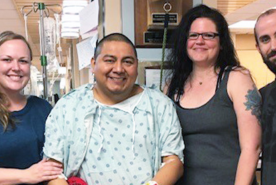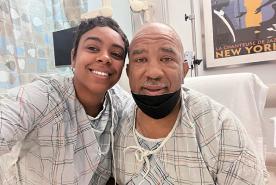Table of Contents
- What does "brain death" mean?
- How is it decided that an individual is brain dead?
- What happens to an individual while these tests are being done?
- Are there drugs that can stop the brain from working and give a false diagnosis?
- If brain death is confirmed, why does an individual's heart continue beating?
- Is it possible that an individual is in a coma?
- Is there anything else that can be done?
- What happens when an individual is declared brain dead?
- Does an individual feel any pain or suffer after brain death is declared?
- After brain death is declared, what happens next?
The diagnosis of brain death is defined as "death based on the absence of all neurologic function." Families who have had a loved one declared brain dead may have questions about what the term really means.
What does "brain death" mean?
Brain death is a legal definition of death. It is the complete stopping of all brain function and cannot be reversed. It means that, because of extreme and serious trauma or injury to the brain, the body's blood supply to the brain is blocked, and the brain dies. Brain death is death. It is permanent.
How is it decided that an individual is brain dead?
A doctor will do tests to make a diagnosis of brain death. These tests are based on sound and legally accepted medical guidelines. Tests include a clinical examination to show that an individual has no brain reflexes and cannot breathe on his or her own. In some situations, other tests may be needed. You can ask your doctor to explain or show you how brain death was determined for your loved one.
Possibly, an individual may show spinal activity or reflexes such as twitching or muscle contractions. Spinal reflexes are caused by electrical impulses that remain in the spinal column. These reflexes may happen even though the brain is dead.
What happens to an individual while these tests are being done?
The individual is placed on a machine that breathes for him or her, called a ventilator. This machine is needed because the brain can no longer send signals telling the body to breathe. Special medications to help maintain blood pressure and other body functions may also be given. During the brain death testing, the ventilator and medications continue but they do not affect the results of the testing.
Are there drugs that can stop the brain from working and give a false diagnosis?
Certain drugs can mask brain function, such as muscle relaxants and sedatives. Testing can only be done when the individual has low levels of these drugs in the body. It may be necessary to wait for these levels to go down. The doctor can then accurately measure brain activity. Sometimes, other tests are done to confirm brain death if certain drugs are present in the body.
After brain death is declared, what happens next?
A health care professional will talk with you and your family about certain decisions that need to be made at this time. Among those decisions could be removing the ventilator and the possibility of organ and/or tissue donation.
Remember, the individual is already legally dead and removing the ventilator does not cause death.
See also in this A-Z guide:

















